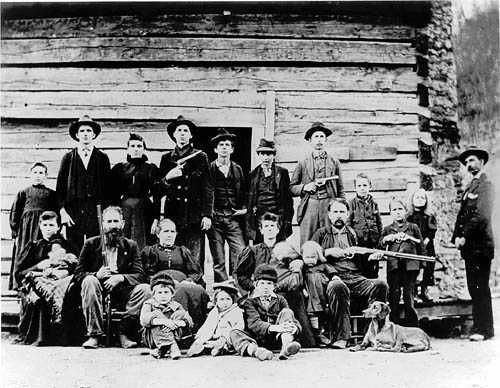Devolution, predation, and the forum fathead phenomenon
Version 1.0, © 2008 by Dale Cotton, all rights reserved.

Fig. 1: A simple cybernetic mechanism
A seemingly very simple concept launched a revolution in circuit design last century called cybernetics then went on to infiltrate dozens of other disciplines. When you're steering a boat, whether by oar or by rudder, you don't measure current direction and strength, then combine that with wind speed and direction. Instead, you notice whether your craft is nosing port or starboard, apply a counter force, then watch to see if you've over-corrected or under-corrected, then try again. In cybernetics this is called a negative feedback loop, with the word "negative" here having a purely technical connotation.
You're two years old playing with another two year old who grabs the toy you're playing with in order to play with it himself. You punch him in the snout and attempt to snatch the toy back. Only problem is the other child happens to be twice your size and you get pounded into a pulp. As a result of the "negative" feedback from that you learn to take your opponent's ability to retaliate into account whenever you feel the urge to make an aggressive move. All for the good. Then you're eight or ten years old and have your first encounter with gang fighting. From that you learn that five guys can always pound one guy into a pulp; that no one guy is safe to pick on if he has friends (whether they're present at the time or not), and your only chance of avoiding a shellacking is to be on the side with the most guys. (In theory, you could even learn that no one ever wins a gang fight because one incident inevitably leads to another incident, ad infinitum.)

Fig. 2: Hatfield family, 1897 (photographer unknown)
You don't have to actually participate in such a vendetta to benefit from the lessons to be learned, witnessing one should be enough. So it would hardly seem possible for a human being to reach physical maturity without vividly understanding that might makes right is a sucker's proposition. The fact that we do have street gangs today and they're flourishing rather than diminishing in number attests to two forces at work.
Force one is that the human race is ironically DE-volving thanks to its own success. Any species not at the top of the food chain is under constant evolutionary pressure to maintain or improve its fitness, since the weak and the unintelligent are picked off by predators. Humans, on the other hand, can afford to shelter the weak and allow the below-average to reproduce. Net result is a slow but steady decline in average intelligence – at least until average intelligence becomes so low that predation can kick in again.
Force two is intelligent predator psychology. Homo sapiens has found its niche as an omnivorous species, but with the balance having shifted in favour of the more nutrient-efficient carnivory, as humanity's tool-making gift came into play. Combine that with the fact that a human animal takes years instead of months to reach full growth, and you have a race in which males hunt while females gather. In contrast, most predatory species have both sexes hunting. But with males as the predator specialist for homo sapiens, evolution proceeded to tailor male psychology toward predation and female psychology toward nurturing and child rearing.
The practical implication of male predation is that the male human cannot afford to be encumbered with empathy. The hunter cannot afford the luxury of feeling sorry for his victims. The human brain has the capacity for modeling future outcomes based on current situations. So it would be quite reasonable for a hunter to reflect, when he finds he's just killed a lactating female of some species, that somewhere there is a litter of young that will now starve to death. But such considerations are contra-survival, so evolution proceeded to cripple the male human brain in such a way that it would tend not be encumbered with compassion. (I remember a theory from a decade or two ago suggesting that the mechanism evolution hit on has to do with reducing the degree to which human males use both halves of their brain in concert: unlikely to stand up to the fMRI but certainly an appealing idea.)
In fact, the situation is more complex. Because homo sapiens is a co-operative, or pack, species, hunting teams and tribes benefit from leadership. Effective leadership required a (male) individual with the physical ability to dominate combined with the psychological ability to empathize with other team members enough to short-circuit rivalries, etc. So eliminating empathy entirely from the male human psyche would have been counterproductive. Instead, it became just another trait added to the Mendelevian mix. A few males in each generation per tribal group will have as much compassion as a female, a few will be rampant sadists, and most will fall in between.

Fig. 3: A simple cybernetic mechanism
Back to cybernetics. The flip side of the negative feedback loop – naturally – is the positive feedback loop. The common household thermostat (see Fig. 2) is a simple negative feedback device. You set a target temperature and a threshold value. When the temperature falls below the target temperature by the threshold amount (perhaps two degrees), the thermostat turns on the furnace and leaves it on until it measures the temperature as being above the target by the threshold value. And repeat. A positive feedback thermostat would do just the opposite: if the temperature rose two degrees above the target it would turn on the furnace and turn the furnace off ... when? You see the problem. Yet the positive feedback loop is a fundamental element in human psychology. Praise a two year old for saying something "cute" and he'll hang around adults the rest of the day inundating all and sundry with what he hopes will be similarly cute verbalizations – until someone swats him on the side of the head to inject a negative feedback correction.
Positive feedback combined with self-awareness (ego) is a truly explosive combination. Combine that with male aggression and a human-level intellect and you have that wonderful mix of competition, combat, warfare, genocide, and assured overkill we are currently blessed with as a species. While two world wars and a cold war were splashy examples of this explosive mixture at work, it's equally culpable for two more recent and more homey phenomena: road rage and forum fatuity.
Any negative feedback control that a typical human male may have painfully acquired to temper his natural aggression goes out the window as soon as you put him in a different arena. Face to face two males will temper their urge to aggress and dominate based on prior experience, including bloody noses. When you put the same two males in contact behind windshields or on-line, the instinct to combat remains, but you've removed the visual cues of personal presence that trigger the negative feedback governor that might otherwise kick in.
Whatever mechanism evolution came up with to short-circuit empathy – the ability to see the consequences of one's contemplated actions from the other guy's point of view – it is functionally equivalent to a male retardation agent. For example, a professional photographer is a person who makes his living by winning contracts to take photographs for money. Yet he will quickly degenerate to name-calling and bombastic idiodicy on-line, totally oblivious to the fact that he's posting in a photography forum. And of course a photography forum is just the sort of place that potential clients are apt to look at when researching whom to hire. It doesn't take much intelligence to think through the consequences of publishing one's immature behaviour in the archived media of the Internet. Yet the male retardation factor forestalls any such moment of reflection in the heat of conflict, just as it prevented Hector from ignoring Achilles' jibes a few thousand years ago.

Fig. 4: Achilles slays Hector, Rubens
Of course, a sufficiently clever professional photographer not only would not point out this obvious fact to other professionals, he would instead take every opportunity to subtly goad them into on-line infantility, thereby reducing the size of the competitive field. Whether that level of cleverness can today exist in an individual of species homo sapiens after millenia of species devolution is another queston. ;) What I can say after several decades spent frequenting on-line fora is:
I've got a little list. They never will be missed.